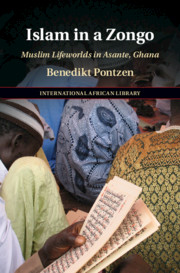Book contents
- Islam in a Zongo
- The International African Library
- Islam in a Zongo
- Copyright page
- Dedication
- Contents
- Figures
- Acknowledgements
- A note on style
- Glossary
- Introduction
- 1 A history of Muslim presence in Asante
- 2 Muslim presence and zongos in Asante
- 3 Those who pray together
- 4 Speaking for Islam
- 5 ‘Bōkā’
- Conclusion
- Appendix
- References
- Other sources
- Index
- Titles in the Series
5 - ‘Bōkā’
On Islamic discourses, imaginaries, and incommensurability
Published online by Cambridge University Press: 08 January 2021
- Islam in a Zongo
- The International African Library
- Islam in a Zongo
- Copyright page
- Dedication
- Contents
- Figures
- Acknowledgements
- A note on style
- Glossary
- Introduction
- 1 A history of Muslim presence in Asante
- 2 Muslim presence and zongos in Asante
- 3 Those who pray together
- 4 Speaking for Islam
- 5 ‘Bōkā’
- Conclusion
- Appendix
- References
- Other sources
- Index
- Titles in the Series
Summary
In Chapter 5, I discuss how people’s divergent Islamic conceptions, practices, and imaginaries can become incommensurable with one another. I describe and discuss the different Islamic divination and healing practices encountered in the zongos and trace their surrounding discourses and debates. These ‘bōkā’ practices are diverse and contested, if not rejected outright by their critics. Proposing the concept of the imaginary, I argue that these practices should be considered in their respective contexts and in view of people’s understandings of how things (should) hang together. I therefore present two ‘bōkā’ practitioners and relate the discourses they hold on their practices, seeking to convey how they ground these in the Islamic discursive tradition and make sense of them. I also discuss people’s varied conceptions and practices of ṣadaqa. I then present the critiques of ‘bōkā’ by different actors and highlight how they ground these within and lay claim to the same discursive tradition of Islam. As I argue, the people of the zongo engage with and take part in a shared discursive tradition as they (re)make and live their religion. Yet, the ways in which they participate in this religion and what they make of it are not only open to varied engagements but inherently diverse.
Keywords
- Type
- Chapter
- Information
- Islam in a ZongoMuslim Lifeworlds in Asante, Ghana, pp. 177 - 224Publisher: Cambridge University PressPrint publication year: 2021

